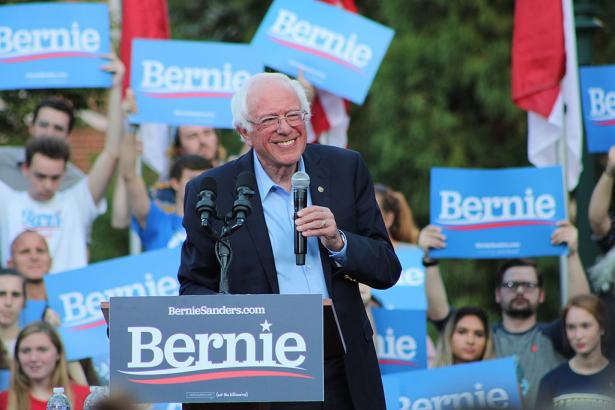Last week, Politico reported that Bernie Sanders is making a pitch to head the Department of Labor under a potential Biden administration. That’s welcome news. In recent months, workers in the United States have been ravaged by the coronavirus — losing their jobs in the COVID-19 recession, braving life-threatening workplace conditions — and, over the last generation, they have been ravaged by political and policy retreat: on collective bargaining rights, on labor standards, and on workplace health and safety. The next secretary of labor, with a little legislative support, will be in a position to undo at least some of that damage.
The Department of Labor does not make policy, but — like all executive agencies — it enjoys wide discretion in interpreting and enforcing (or not enforcing) existing laws and regulations. It oversees basic labor standards (minimum wage, overtime, prevailing wage) and investigates wage theft. It can extend the reach of covered employment, enforce federal occupational health and safety laws, and ensure compliance with the Family Medical and Leave Act. It administers the Employee Retirement Income Security Act (ERISA), the federal law that regulates employment-based pension plans. And it collects the survey and administrative data that inform policy assessment and policy change. Even without (sorely needed) changes to labor law, a crusading labor secretary could make a big difference in the lives of workers.
In more recent years, Bill Clinton’s labor secretary, Robert Reich, pursued enforcement not just by fielding complaints but through targeted audits of industries where flouting labor standards had become a business model. One of Barack Obama’s labor secretaries, Tom Perez, raised the threshold for overtime coverage (a decision the Trump administration has since undermined) and brought home health care workers under the Fair Labor Standards Act.
The importance of the post can also be seen in some less inspired choices. Since the 1970s, Republicans have treated the labor secretariat (and the National Labor Relations Board) as either a sinecure for corporate flacks with little interest in workers’ rights or as an opportunity to do real deregulatory damage. Reviewing Elaine Chao’s dismal tenure as George W. Bush’s secretary of labor, the Government Accountability Office concluded that the department’s wage and hour division “inappropriately rejected complaints based on incorrect information provided by employers, failed to make adequate attempts to locate employers, did not thoroughly investigate and resolve complaints, and delayed the initiation of investigations.”
Under Trump, the GOP’s fox-in-the-henhouse strategy has been elevated to a farce. Trump’s first choice was Andrew Pudzer, a fast-food CEO and ardent opponent of even minimal labor standards. This was less a nomination than a provocation — the equivalent of appointing Abbie Hoffman as secretary of defense. When Pudzer withdrew in a storm of unrelated controversy, Trump turned to Alexander Acosta, whose deregulatory rampage through the department was cut short last year by the revelation that, as a US attorney in Florida in 2007, he made a sweetheart plea deal with Jeffrey Epstein. Enter Eugene Scalia, whose qualifications hinged on his representation of Ford, Boeing, UPS, Walmart, and SeaWorld against charges of violating wage, worker safety, and antidiscrimination law.
This fealty to corporate interests has been magnified during the COVID-19 crisis. Scalia’s Labor Department has issued guidances that undercut the relative generosity of the CARES Act’s unemployment and sick leave provisions. It has punted any responsibility for worker safety — neglecting to require employers to meet the most basic public health guidelines for social distancing and protective equipment. It has instead relaxed any expectations of employers, including an April decision to relieve businesses of the burden of reporting workplace outbreaks or infections. And when employers have flouted token protection, the department’s response — for instance, a $13,500 fine for the Smithfield Plant in South Dakota that infected twelve hundred workers and killed four — has been more a wink and a nod than a slap on the wrist.
All of this is to say that the Department of Labor and its next leader can make a big difference — for good or for ill — in the lives of workers. Amid a still-raging pandemic, the next labor secretary will need to adapt the country’s labor standards to the new world of risk — which means renewed attention to the reach, generosity, and technical capacity of the country’s unemployment insurance system; a dramatic expansion of paid leave; and a minimum wage that protects and rewards frontline workers. More broadly, the next labor secretary will have to tackle the long-overdue task of updating the country’s labor standards and social programs to a twenty-first-century labor market — for which the New Deal vision of economic security, focused on stabilizing the “breadwinner” incomes of men in industrial employment, is an increasingly poor fit.
Especially in the absence of robust union representation, the standards and policies the Department of Labor oversees need to address the security and safety of all workers, in all varieties of jobs and employment relationships. Similarly, in an economy where precarious employment and violating labor standards is a dominant business model, the department will have to bring low-road employers to heel.
Each of these regulatory responsibilities — the minimum wage, overtime, occupational safety, family leave — were originally won by organized labor. And so finally, the next labor secretary will need to make the case that the best way to raise and enforce labor standards is to rekindle collective bargaining rights and democratic voice in the workplace.
Sounds like a job for Bernie.
OUR NEW ISSUE, “FAILURE IS AN OPTION,” IS OUT SOON. WE DISCUSS WHY THE UNITED STATES’ INSTITUTIONAL BREAKDOWN WON’T STOP AFTER TRUMP LEAVES OFFICE AND WHAT CAN DONE TO IMPROVE THINGS FOR WORKING PEOPLE. GET A DISCOUNTED PRINT SUBSCRIPTION TODAY!
ABOUT THE AUTHOR
Colin Gordon is a professor of history at the University of Iowa and the author, most recently, of Citizen Brown: Race, Democracy, and Inequality in the St. Louis Suburbs.


Spread the word